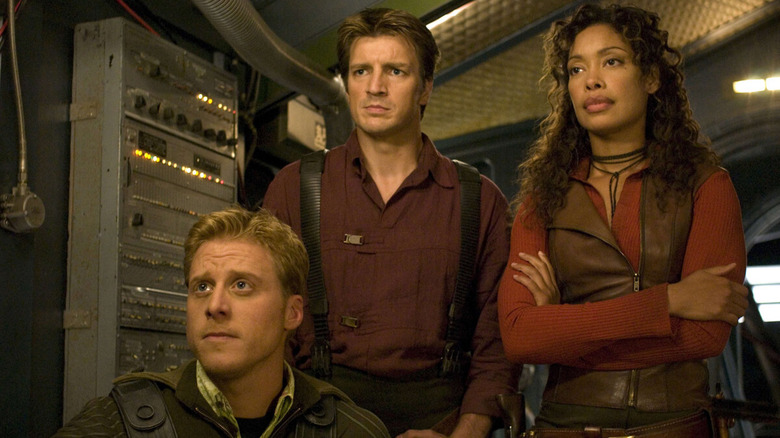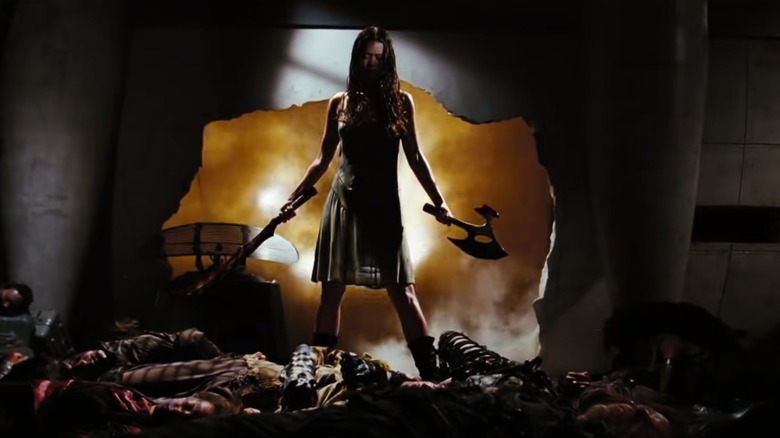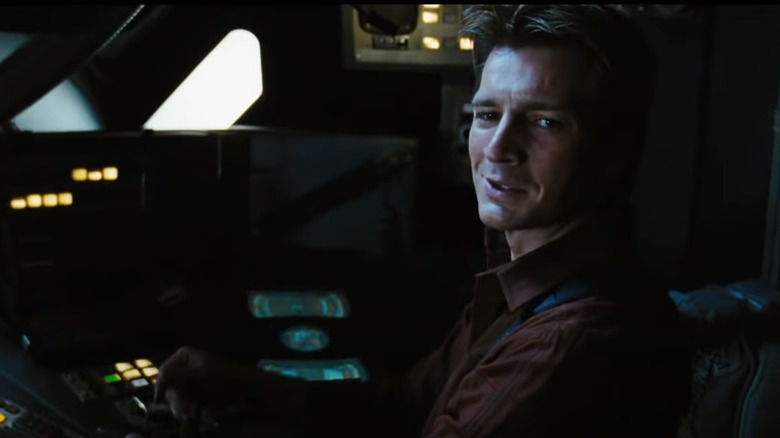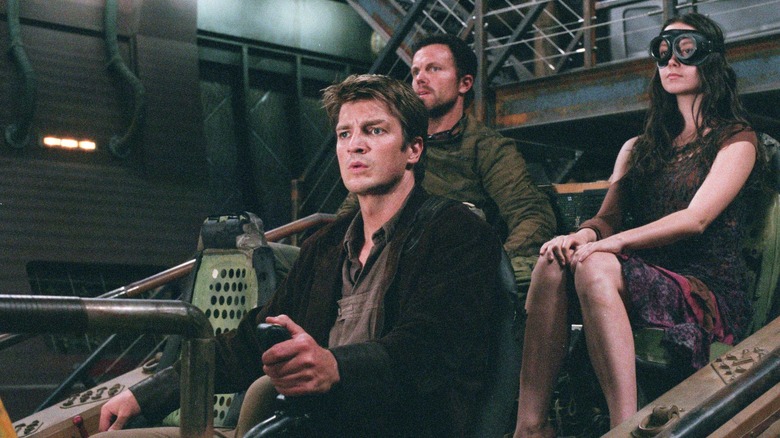Joss Whedon's Serenity Ending Explained: By Popular Demand, The Ship Takes One Last Flight
Fan campaigns can be a powerful thing, and one of the most successful ones came in the form of the 2005 film "Serenity," which served as a follow-up to the cancelled-too-soon Joss Whedon series, "Firefly." Long before the cries for a "Snydercut" ever hit the internet, there was a fan movement to get answers following the cancellation of "Firefly" after only one season. Unlike the fan campaign that managed to get "Star Trek" back on the air after a wobbly first season in the 1960s, the "Firefly" fan campaign earned them a different reward: a big, bold action-adventure movie directed by the series' showrunner himself, Joss Whedon.
"Firefly" was a story about scrappy survivors and outcasts, and the theme song's chorus, "you can't take the sky from me," became the mantra of the fandom, who called themselves "Browncoats" after the series' rebel faction who had lost their universe-wide war. Whedon took that idea one step further in "Serenity," turning the crew of the ship Serenity into more than just a ragtag crew with varied backgrounds and making them into whistleblowers who managed to help fight back against the oppressive Alliance through knowledge instead of violence. "Don't take the sky from me" became "can't stop the signal," but either way the message was clear: the fictional Browncoats and the fans that idolized them were a force to be reckoned with. Whether or not that ended up being a good thing, however, is up for debate.
Romanticized rebellion
The plot of "Serenity" is fairly simple: the crew of the Firefly-class ship Serenity, led by Captain Malcolm "Mal" Reynolds (Nathan Fillion), discover that the mindless, deadly Reavers that terrorize every part of outer space were actually Alliance civilians mutated by accident during a very unscrupulous, planet-wide pharmaceutical trial. They created a calming chemical that was supposed to placate the people of the planet Miranda, but instead most of them grew so calm that they just laid down and died. A small percentage, however, became ultra-violent cannibals: the Reavers.
Mal and the crew take the information to their associate, Mr. Universe (David Krumholtz), who has incredible communications tech and can spread the message galaxy-wide. He's the one who says "you can't stop the signal," and even though several characters sacrifice their lives to get that signal out, they do manage to share the truth with everyone. Information is power, and they delivered that power to the people. It's a rousing story that leaves you feeling mostly good about our heroes, but it's not without its issues, including an unnecessary character death, some problems with its version of history, and Whedon's less-than-stellar legacy.
Plans for more
Each of the members of the crew of the Serenity are lovable in their own way, but the ship's pilot, Wash (Alan Tudyk) was probably the biggest fan favorite. He was jovial and funny, married to the ship's tough-as-nails ex-Browncoat first mate Zoë (Gina Torres), and frequently played with toy dinosaurs in the cockpit. At the end of "Serenity," Wash dies rather horrifically when the ship crashes and he's impaled in the crash. He wasn't the film's first major death, either, as Shepherd Book (Ron Glass) also died earlier in the movie. The double-dose of deaths was frustrating for fans, who wanted to imagine Wash and Zoë living out their lives together. In the end, it turns out that the pilot's death wasn't necessitated by any sort of creative decision, but happened because Tudyk had other commitments and couldn't sign on for Whedon's planned sequels.
Unfortunately, "Serenity" barely made its budget back at the box office, and the film's appreciation has been tainted in retrospect because of the show and its creator's complicated legacy. The series tried to be an allegory for the American Civil War that unfortunately falls rather flat when you realize that the Browncoats are romanticized versions of the Confederacy, and later down the line, Whedon came under fire for his behavior on the set of "Justice League."
Emboldening future fandoms
"Serenity" made a big splash among fans, but its mixed legacy and less-than-stellar box office turnout meant that the beloved spaceship would never fly again. There have been official comic book adaptations and novelizations, but the story of the Serenity and its plucky crew came to an end on the big and small screen with the movie. Where the film had a larger impact, however, was in fan circles.
Fans of other cancelled or altered properties looked to "Serenity" getting made as a green light for their own fan campaigns. Ironically enough, Whedon's biggest detractors pulled from the same playbook in trying to get his version of "Justice League" pulled in favor of original director Zack Snyder's cut of the film. Would the Snydercut crew have been as loud or as emboldened in a world where Whedon's own fan campaign hadn't gotten a movie made? The world may never know, but it must have helped. Some "Firefly" fans have even continued to try and rally and get the show brought back, or have another movie made, to the point that some of the show's stars just want to move on.
Fandoms will always be passionate, and fans of shows or movies that get canceled or changed will always try their best to save their faves, but "Serenity" was the result of one of the biggest, boldest, and arguably most impactful fan campaigns of all time, for better or worse.



